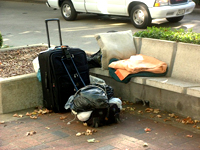College student joins growing homeless list


Photo Illustration
Business major Andrée Duckworth, 30, is different, although by all appearances she’s just another OCCC student.
What separates Duckworth from most students on campus is she is homeless.
Unfortunately, Duckworth is not the only homeless student on campus or in the U.S., said Barbara Duffield, policy director for the National Association for the Education of Homeless Children and Youth, in an e-mail interview with the Pioneer.
“There are not any statistics on the number of college students who experience homelessness,” Duffield wrote. “The only number we can share is the number of students who indicate a homeless status when they fill out the FAFSA (the federal financial aid form).”
Based on statistics from a number of sources Duffield provided, it appears between one-half and 1 percent of all college students are homeless or near homeless in the U.S. At OCCC, that number would be 75 to 150 students.
The U.S Department of Housing and Urban Development defines being homeless as lacking “a fixed, regular, and adequate nighttime residence. This includes individuals who have a primary nighttime residence that is a supervised public or privately operated shelter designed to provide temporary living accommodations.”
Duckworth, along with her two children, have lived in transitional housing for children in crisis for the past year and a half. She works 25 hours a week at a retail job while currently taking 16 hours at OCCC.
Although Duckworth said she is grateful to have a roof over her head, she pays a price for living in institutional housing.
“I have to account for where I am at all times,” Duckworth said. “I have no privacy at all. I have to submit to random inspections of my apartment. The inspectors can come in and out whenever they want.”
In addition, Duckworth is required to attend weekly Bible study and church on Sundays, as well as report all of her financial earnings and activities.
Duckworth describes her situation as unstable. A year and a half ago, she was engaged and was a stay-at-home mother after the birth of her second child. At one point, she realized that her living situation was unhealthy.
“My fiancé, while he never struck me, was never around,” Duckworth said. “He wouldn’t let me work because he was so controlling and I had no savings. Utilities were being shut off and I was alone with two children and we had no water or electricity.”
Duckworth dialed *211, a crisis phone number which provides free and confidential information for food, housing, employment, health care and counseling. She explained her situation to the counselor who answered the phone.
A few phone calls to other assistance agencies led Duckworth and her children to their current living situation with transition housing for children in crisis.
She decided going back to school was the only way to get off welfare and break the cycle of poverty.
Duckworth said she also has received support from her professors and from Student Support Services.
Duffield’s organization, NAEHCY, has advocated for policy changes in the FAFSA which would make it easier for homeless individuals to receive funding, she said.
In 2009, rules were changed on the form in part to allow students who have experienced homelessness in high school to be able to be verified as homeless by a HUD adviser, homeless shelter director or financial aid officer without having to go through additional steps to qualify for financial aid, Duffield said.
Most students and staff may not realize just how close they are to becoming homeless themselves.
“We are one accident away from being in a similar situation,” said OCCC Learning Support Specialist Mary Turner.
“Unless students have someone who can take them in, they would be on the street or in a shelter,” Turner said. “When you have kids, it’s especially hard this time of year. With the weather getting colder and colder, shelters are full.”
Turner often encounters students who are homeless and need assistance. She said she encourages students facing similar adversity to use the community resources page in the Student Support Services section on the OCCC website.
“I know it is embarrassing to have those kinds of needs, but if people do not know how to get those resources, we encourage them to talk to us to see what we can help them with,” Turner said.
Turner and fellow staff members at Student Support Services, as well as OCCC faculty, have been known to make sure students are fed, have a place to go or even given bus fare for transportation to a shelter.
“OCCC has a big heart,” Turner said.
Duckworth is currently looking for an apartment for her and her children. She said she’s not asking for pity, but she does want to clear up the stereotypes surrounding being homeless.
“I got myself in a bad pinch and did what was necessary,” Duckworth said. “I have learned a lot from it.
“I think that if people walk out in the world, they need to realize homeless people are not beggars who live on the streets. I go to school, work and take care of my kids. I don’t have a criminal record or a drug and alcohol problem.
“I am working every day to better myself,” Duckworth said. “I think if I could survive this I could do anything,”
Students in need of assistance with homelessness or other education issues can contact Student Support Services online at www.occc.edu/support/community.html or by phone at 405-682-7520.
To contact the National Association for the Education of Homeless Children and Youth, call the helpline toll-free at 1-800-308-2145 or homeless@serve.org.